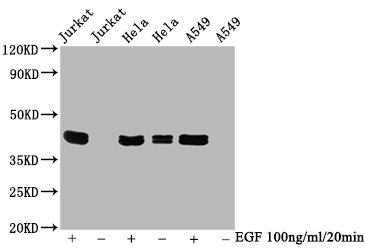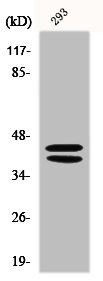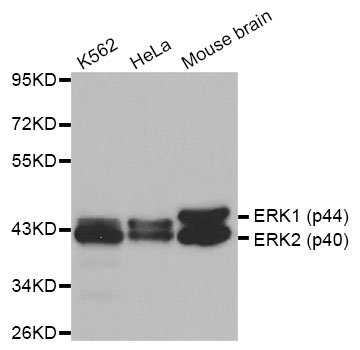
Western Blot Positive WB detected in Jurkat whole cell lysateela whole cell lysate549 whole cell lysate(treated with EGF or not) All lanes Phospho-MAPK3 antibody at 0.95microg/ml Secondary Goat polyclonal to rabbit IgG at 1/50000 dilution Predicted band size: 42 KDa Observed band size: 42 KDa
Phospho-MAPK3 (T202/Y204) + MAPK1 (T185/Y187) Recombinant Monoclonal Antibody
CSB-RA013456A204PHHU
ApplicationsWestern Blot, ELISA
Product group Antibodies
ReactivityHuman
TargetMAPK1
Overview
- SupplierCusabio
- Product NamePhospho-MAPK3 (T202/Y204) + MAPK1 (T185/Y187) Recombinant Monoclonal Antibody
- Delivery Days Customer20
- ApplicationsWestern Blot, ELISA
- CertificationResearch Use Only
- ClonalityMonoclonal
- Clone ID4F6
- ConjugateUnconjugated
- Gene ID5594
- Target nameMAPK1
- Target descriptionmitogen-activated protein kinase 1
- Target synonymsERK, ERK-2, ERK2, ERT1, MAPK2, NS13, P42MAPK, PRKM1, PRKM2, p38, p40, p41, p41mapk, p42-MAPK, mitogen-activated protein kinase 1, MAP kinase 1, MAP kinase 2, MAPK 2, extracellular signal-regulated kinase 2, mitogen-activated protein kinase 2, protein tyrosine kinase ERK2
- IsotypeIgG
- Protein IDP27361
- Protein NameMitogen-activated protein kinase 3
- Scientific DescriptionSerine/threonine kinase which acts as an essential component of the MAP kinase signal transduction pathway. MAPK1/ERK2 and MAPK3/ERK1 are the 2 MAPKs which play an important role in the MAPK/ERK cascade. They participate also in a signaling cascade initiated by activated KIT and KITLG/SCF. Depending on the cellular context, the MAPK/ERK cascade mediates diverse biological functions such as cell growth, adhesion, survival and differentiation through the regulation of transcription, translation, cytoskeletal rearrangements. The MAPK/ERK cascade plays also a role in initiation and regulation of meiosis, mitosis, and postmitotic functions in differentiated cells by phosphorylating a number of transcription factors. About 160 substrates have already been discovered for ERKs. Many of these substrates are localized in the nucleus, and seem to participate in the regulation of transcription upon stimulation. However, other substrates are found in the cytosol as well as in other cellular organelles, and those are responsible for processes such as translation, mitosis and apoptosis. Moreover, the MAPK/ERK cascade is also involved in the regulation of the endosomal dynamics, including lysosome processing and endosome cycling through the perinuclear recycling compartment (PNRC); as well as in the fragmentation of the Golgi apparatus during mitosis. The substrates include transcription factors (such as ATF2, BCL6, ELK1, ERF, FOS, HSF4 or SPZ1), cytoskeletal elements (such as CANX, CTTN, GJA1, MAP2, MAPT, PXN, SORBS3 or STMN1), regulators of apoptosis (such as BAD, BTG2, CASP9, DAPK1, IER3, MCL1 or PPARG), regulators of translation (such as EIF4EBP1) and a variety of other signaling-related molecules (like ARHGEF2, FRS2 or GRB10). Protein kinases (such as RAF1, RPS6KA1/RSK1, RPS6KA3/RSK2, RPS6KA2/RSK3, RPS6KA6/RSK4, SYK, MKNK1/MNK1, MKNK2/MNK2, RPS6KA5/MSK1, RPS6KA4/MSK2, MAPKAPK3 or MAPKAPK5) and phosphatases (such as DUSP1, DUSP4, DUSP6 or DUSP16) are other substrates which enable the propagation the MAPK/ERK signal to additional cytosolic and nuclear targets, thereby extending the specificity of the cascade.
- ReactivityHuman
- Storage Instruction-20°C or -80°C
- UNSPSC41116161






